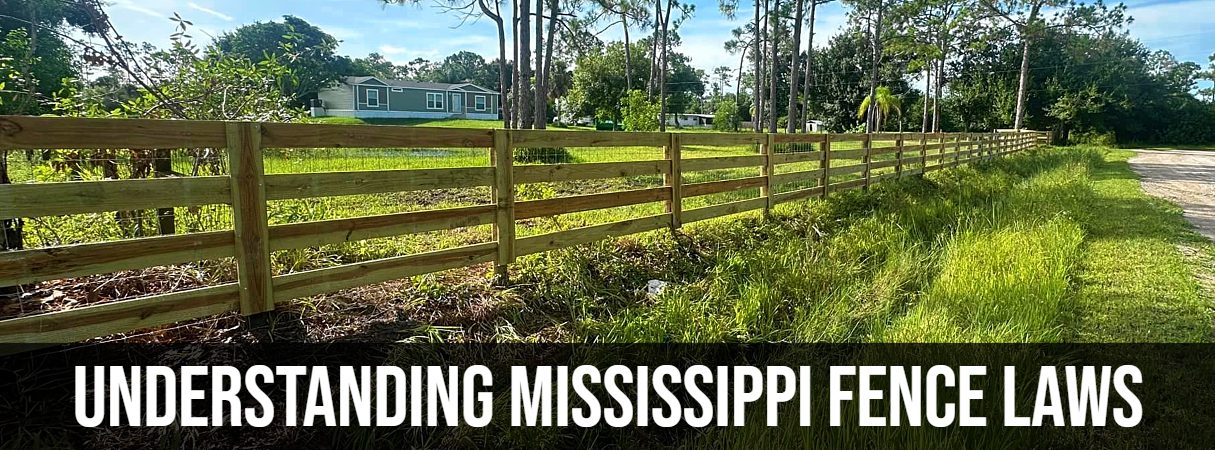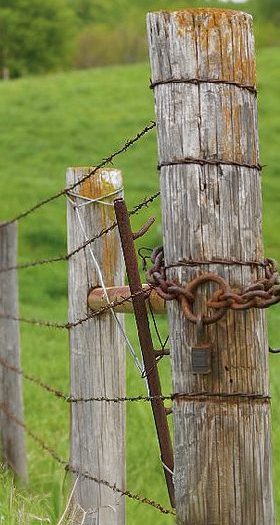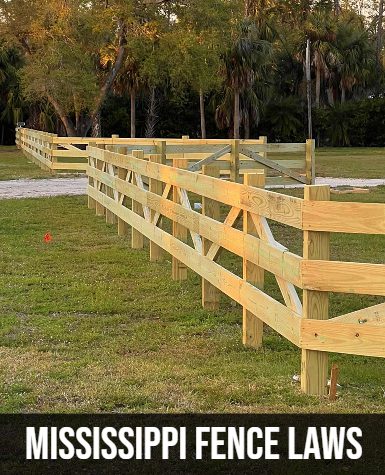
Overview of Mississippi Fence Laws
Fences: They keep things in, keep things out, and sometimes they keep your neighbors up at night with boundary disputes. Before you grab those posts and hammer away, take a moment to learn the ins and outs of Mississippi fence laws. Whether you’re eyeing that perfect white picket or something tall and private, this guide will walk you through the key legal stuff without making your head spin. Let’s dive into what Mississippi expects from your next fence-building adventure.

Who Is Responsible for Fence Maintenance in Mississippi?
Ah, the eternal question: If a fence falls in Mississippi and no one wants to fix it, who’s responsible? In the Magnolia State, the answer often comes down to who owns the fence and where it sits. If the fence is sitting right on the property line, your neighbor might be in for a little teamwork. Generally, both property owners are responsible for maintaining a boundary fence. But hey, if your neighbor’s dog has been digging under it or they’ve let their vines take over, they might need to pitch in a little more.
When it’s your fence, sitting comfortably on your land, congrats—you get full maintenance duties. But, if you and your neighbor split that cost, it’s a great excuse to chat about something other than noisy lawnmowers.
Mississippi Fence Height & Placement Regulations
Mississippi doesn’t take a one-size-fits-all approach to fence laws, especially when it comes to height. For those who think “the bigger, the better,” you might want to check with your local city or county before building that towering backyard fortress. Most residential areas limit fence heights to around 6 feet in the back and 4 feet in the front yard.
Do You Need a Permit for Fence Installation in Mississippi?
Permits, the word that strikes fear into the hearts of DIYers everywhere. The good news? You don’t always need one in Mississippi. However, certain municipalities might want you to get a permit, especially if you’re building a fence taller than your neighbor’s ego. Always check local regulations or give the city a call before you start digging.
Property Line Considerations
As tempting as it may be to claim a few extra feet of your neighbor’s lush lawn, placing your fence squarely on their property line isn’t the way to make friends. If you’re looking to avoid a legal squabble, be sure to know exactly where your property ends. Hiring a surveyor to define those lines is a smart move—unless you want to find yourself in a showdown over who owns the fence once it’s up.
Understanding Boundary Disputes
Let’s be real: a good fence should stop more than just deer and stray dogs. It should also stop awkward interactions with your neighbor. But what happens when that fence you thought was neatly placed on your property is suddenly a topic of dispute? Mississippi law has some answers.
How Mississippi Law Handles Boundary Disputes
Mississippi courts prefer neighbors to solve fence disputes on their own. After all, nobody wants a courtroom showdown over a few feet of fence. But if things get tense, the courts will look at property surveys and deeds to settle the matter. Pro tip: clear communication with your neighbor can save you both from a lengthy legal battle.
What to Do If a Neighbor’s Fence Encroaches on Your Property
If your neighbor’s fence has wandered onto your side, you’ve got options. You can start with a friendly conversation (and maybe bring cookies). If that doesn’t work, a formal letter or mediation might be next. In Mississippi, you have the right to ask for the fence to be removed from your property, but no one said it would be easy.

Mississippi’s “Fence In” vs. “Fence Out” Laws
If you’re a livestock owner, Mississippi’s fence laws get a little more interesting. Unlike some states, Mississippi primarily follows “fence in” laws. In plain English: if you own livestock, it’s your responsibility to fence them in. Your cows, goats, and chickens can’t just roam free unless you enjoy chasing them down and dealing with angry neighbors.
Mississippi livestock owners need to make sure their animals don’t wander onto neighboring properties. Failing to contain livestock could result in fines, and if your wandering cow destroys a neighbor’s garden, you might be on the hook for damages. Building a sturdy fence isn’t just smart; it’s the law.
Can You Legally Build a Fence on an Easement in Mississippi?
Easements: the invisible lines that can make your fencing plans go awry. An easement allows another party (like the utility company) to access part of your property. If you’ve got an easement running through your yard, tread lightly. You can build a fence, but it needs to stay out of the way of the easement’s purpose. Translation: don’t block access to a utility box or water line unless you like unpleasant surprises from utility workers.
Fencing Materials: What’s Allowed in Mississippi?
You’ve got a lot of freedom when it comes to fence materials in Mississippi, but that doesn’t mean anything goes. While wood and vinyl are popular choices, chain-link is also common in many areas. That said, certain homeowners’ associations or local governments might restrict certain materials, especially if they don’t fit the neighborhood’s aesthetic. (No, that neon green fence probably won’t fly with the HOA.)
Do You Need Your Neighbor’s Permission to Build a Fence?
Mississippi doesn’t require you to get your neighbor’s permission before building a fence, but it’s a good idea to loop them in. If you’re replacing a shared fence, it’s even more crucial. A simple conversation can prevent a lot of drama down the road, like finding out that your neighbor really hates that rustic wood look.
Penalties for Violating Mississippi Fence Laws
Nobody likes getting hit with fines, especially for something as avoidable as a fence violation. If your fence doesn’t meet Mississippi’s regulations—whether it’s too tall, too close to a street, or made from restricted materials—you could face penalties. In some cases, you might even be required to remove the fence entirely, which is about as fun as it sounds.
Made a mistake? Don’t panic. Fixing an illegal fence is often as simple as modifying the height, moving it, or changing the materials. While it might feel like a pain, correcting the issue before it escalates is always better than battling with the city—or your neighbor.
Final Thoughts on Mississippi Fence Laws
Building a fence in Mississippi can feel like a straightforward task until you find yourself tangled in legal jargon, height restrictions, and boundary disputes. While the rules might seem like a lot to keep track of, having a solid understanding of Mississippi’s fence laws can save you from costly mistakes and neighborly feuds down the road.
Whether you’re trying to keep livestock in, nosy neighbors out, or simply create a little privacy oasis in your backyard, it pays to do your homework. From knowing your property lines to choosing the right materials, each decision you make can impact your property’s value, safety, and, of course, your relationship with those living next door. Remember, a good fence might make for good neighbors, but a legally compliant fence makes for stress-free living!
Before you fire up the posthole digger, take some time to review local regulations and, if needed, get a surveyor involved. Trust me, nothing kills the joy of a newly built fence like discovering it’s two feet over the property line. And when it comes to easements or fence-in laws, double-check everything. Your future self will thank you.
Frequently Asked Questions (FAQs)

1. Do I Need a Permit to Build a Fence in Mississippi?
It depends on where you live. While some rural areas might not require a permit, many cities and counties in Mississippi have specific regulations. If you’re planning to build a fence over a certain height (typically 6 feet), you may need to obtain a permit. It’s always a good idea to check with your local government before starting any construction.
2. What Is the Maximum Height Allowed for Fences in Mississippi?
In most residential areas, the maximum fence height is around 6 feet for backyard fences and 4 feet for front yard fences. However, this can vary depending on your municipality or neighborhood regulations, so it’s essential to confirm the rules with local authorities before building.
3. Who Is Responsible for Maintaining a Boundary Fence Between Two Properties in Mississippi?
In Mississippi, if the fence is on the property line, both property owners typically share the responsibility for maintenance and repairs. However, if the fence is entirely on one owner’s property, that owner is generally responsible for its upkeep. Clear communication with your neighbor is always the best approach to avoid conflicts.
4. Can I Build a Fence on My Neighbor’s Property if They Give Me Permission?
Yes, you can build a fence on your neighbor’s property with their explicit consent. However, it’s wise to get this agreement in writing to avoid future issues, especially if your neighbor sells their property or changes their mind later on.
5. What Should I Do if My Neighbor’s Fence Encroaches on My Property?
If you believe your neighbor’s fence is encroaching on your land, start with a friendly conversation to resolve the issue. If that doesn’t work, you can request a property survey to determine the exact boundary. If the fence is indeed on your property, you have the right to ask for its removal or come to an agreement with your neighbor.